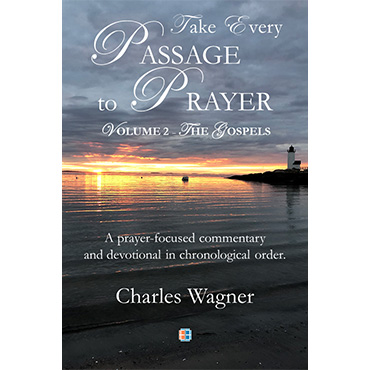The Gramazin Blog

Jesus Heals Man Lowered From Roof
Take Every Passage to Prayer - Volume 2, The Gospels
Friday June 21, 2024
Matthew 9:1-8, Mark 2:1-12, Luke 5:17-26
Father, please give me the kind of compassionate heart for ministry to the needy like these four men exhibited. Please also give me the determination to remain dedicated and persevering in ministry, no matter how hard it gets, to the very end, when the goal of healing or deliverance has occurred. Please give me a faith that will overcome all obstacles so that I can enjoy the blessing of being in Your presence. Father, I cannot have the mind-reading ability of Jesus. I am a mere mortal. However:
- By being attentive to the perspective and needs of others,
- By practicing empathy,
- By being a good listener, day after day in my relationships with them,
- By studying people’s facial expressions, body language, and tone of voice,
- And by making it a lifestyle to ask people to share what is on their hearts,
I can develop a valuable ministry skill of intuition that enables me to “know” what people are thinking even if they haven’t articulated their thoughts to me. Father, please make me this kind of student of the people in my life so that I can minister to them in profound ways. Father, I don’t want it to be said of me that I am ungrateful for the miraculous things You do in my life. Make Your good works in my life my testimony that I share with others, giving You glory. The more stories we hear of what You do for people, the more awe we will have of You. Amen.
Father, a few days later Jesus was on the eastern shore of the Sea of Galilee. He was most likely exhausted from traveling around Galilee, preaching, and healing. He was ready to return to His home in Capernaum. He decided to take a boat to save time so that He didn’t need to walk around the perimeter of the sea.
Word got around that Jesus was back in town. Our text tells us that people, including Pharisees and teachers of the law who were seated , came from every village in Galilee, Judea, and Jerusalem . There were most likely hundreds, if not thousands, of people gathered around the home that Jesus was in. Exhausted and tired, most likely wanting solitary time with You, Jesus gave from His servant’s heart, empowered by the Holy Spirit. He healed the sick and preached to them.
Four men arrived on the scene carrying a paralyzed man on a mat. What can we conclude from this fact, knowing human nature?
- The man’s paralysis was a burden to all five of them. The man suffered and his four friends suffered with him. Their desire for relief was most likely rooted in many agonizing days and nights caring for their friend. There were days when the man seemed too needy and too demanding. “You help him this time! I need a night off!” “Come on and help me get him dinner tonight! I can’t do it alone!” There was the continuous battle of scheduling 24/7 care for him. There were days when the paralyzed man pleaded for help, expecting his friends to make sacrifices for him. There were days the paralyzed man pleaded for forgiveness, aware of the sacrifices his friends were making for him. There were nights when the man needed help at 3 am. His friends had to bathe him and exercise his extremities. There were days when the paralyzed man said he wanted to die and other days his friends wanted to kill him. It was not merely the paralyzed man who wanted relief. It was also his caregivers.
- It is possible that these four men were agents on behalf of the paralyzed man’s family. Is it possible his caregivers were women, perhaps older women, such as a mother, grandmother, or aunt? Is it possible he had been injured in a fall and his young wife was consumed with caring for their young children? Is it possible these four men were doing a kind favor to the women in the paralyzed man’s life who could not carry him on a mat? The answer to these questions is “yes”.
- There was a desperation about their bringing the paralyzed man to Jesus. There were no surgeons or doctors who could heal the man. They had placed their hopes in various idols who did not heal him. They had placed their hopes in traveling charlatans who had taken their money and left town without healing him. There was literally no other hope but Jesus of Nazareth.
- We don’t know how long these four men had carried this man on a mat. Was he a man who lived down the street? Was he a man who lived across town? Was he a man who lived in Cana or Nazareth? Was he man who lived in the Decapolis? Was he a man who lived in Jerusalem? The ordeal of carrying this man on a mat may have taken weeks and included carts over rugged terrain. It could be that the man was carried to the house on a mat from a cart in the street 100 yards away.
Father, we can imagine the scene.
“Can we please come through?”
“No. Take a hike!”
“But we have a paralyzed man here.”
“So, we’ve got a blind man! Get lost!”
“But we’ve traveled from so far away. We’ve got to see Him! Let us through!”
“We’ve all traveled from far away! Shut up!”
“Please, you have no idea how this man has suffered.”
“You’ll be suffering too if you don’t stop trying to come through the crowd! Wait your turn, expletive!”
Jesus most likely heard the commotion outside the home while He was inside the home teaching and healing. It is possible that He, aware of the abuse they were receiving, miraculously put the thought in the five men’s mind to come on down through the roof . It is possible that these five men deliberately climbed onto the roof and put a hole in it because they had received permission from the Holy Spirit, telling them Jesus would be alright with it. It is also possible Jesus singled out these five men for His special attention publicly as justice for any offenses those outside the house had done against them.
Father, I imagine that as soon as the commotion was detected in the ceiling above Jesus, the eyes of the crowd turned to the roof. Jesus may have stopped preaching or healing. The silent crowd witnessed the lowering of a man in a mat. It is reasonable to think that Jesus may have helped, saying “Another four feet… a little more… almost there…got it.”
I can imagine the subsequent conversation, though it is not recorded in the Word of God (the italicized is in the text).
“So, my young man. How nice of you to drop in!” Jesus said with a warm smile. “How can I help you?”
“Master, I know you can heal me. I know you can. I believe it. I am asking for Your mercy upon me. I want to walk again.”
“My son, will you walk in the ways of My Father in heaven? Will you love only Him? Will you praise Him for your ability to walk? Will you use your legs to carry the gospel of the Kingdom of God around this land?”
“Oh, I will! I believe You are the Son of God, the Messiah who has come to take away the sins of the world, even my sins.”
“My son, take heart. Your sins are forgiven.”
The Pharisees and teachers of the law were outraged and whispered amongst themselves:
“Who does this guy think He is, telling this man He has forgiven his sins! That’s blasphemous! Only God can forgive sins!”
Father, the text tells us that Jesus knew what they were thinking. This small detail tells us something about Jesus’ vast intelligence. His powers of observation were unmatched in human history. He had incredible awareness of the people around Him, a skill that no one else has been able to emulate. Jesus not only knew the thoughts of the Pharisees and teachers of the law, but He also knew the thoughts of every other person who was present. He is attentive to people’s needs. He listens to what they are saying. He knows what is in their hearts. Isn’t that what we want from our friends? Don’t we want people who really know us and who care to know us deeply? Jesus truly is the best friend we can ever have.
Jesus must have looked directly at the men seated before Him. I can imagine that His confident glare was unnerving to them.
“Why do you entertain evil thoughts in your hearts? Which is easier: to say, ‘Your sins are forgiven,’ or to say, ‘Get up and walk’? But I want you to know that the Son of Man has authority on earth to forgive sins. (NIV)”
Father, Jesus describes the thoughts of the Pharisees and teachers of the law as evil. What were their thoughts again?
- Jesus does not have the authority to forgive sins.
- Because He is not the Son of God.
It is evil to deny that Jesus forgives sins. It is evil to deny that Jesus is the Son of God. Unbelievers are not simply people who have a different point of view than believers. No, they are in fact “evil” for rejecting the authority of the Son of God to forgive sins. In fact, they are the antichrist.
Who is the liar? It is whoever denies that Jesus is the Christ. Such a person is the antichrist—denying the Father and the Son. No one who denies the Son has the Father; whoever acknowledges the Son has the Father also (NIV). 1 John 5:22-23.
In other words, the Pharisees and teachers of the law who accused Jesus of blaspheme were antichrists. They did not have a relationship with You, even though they thought they did.
It is easy to utter the words, “your sins are forgiven.” Such words could easily stumble across the lips of a fool like myself. However, we know that the only one who can forgive sins is God.
Against you, you only, have I sinned and done what is evil in your sight; so you are right in your verdict and justified when you judge (NIV). Psalm 51:4
Then hear from heaven, your dwelling place. Forgive and act; deal with everyone according to all they do, since you know their hearts (for you alone know every human heart) (NIV). 1 Kings 8:39
By Jesus claiming that He can forgive sin, He is claiming to be God. The skeptic then says to Jesus, “Prove it by a miracle of some kind; doing something only God can do.”
Jesus proves He is God by healing the paralyzed man. Jesus says to him:
“Take up your mat and go home (NIV).” Mark 2:11
The man got onto his feet. He no doubt leapt for joy, ran in place, threw his arms around in circles, and twirled his fingers. He most likely screamed at his friends up in the ceiling. They screamed down with joy themselves. Overcome with emotion, he may have broken down and wept.
“Master, thank You! Thank You! Thank You! What can I do now to serve You?”
“Go and share the good news of salvation with all of those who have cared for you over the years.”
The man walked through the parting sea of gaping mouths on the faces of people and out the door, passing those who had blocked him from entering the house. I can imagine his friends joined him at the bottom of the stairs, hugging and screaming. I can also imagine they sprinted off down the street, trying to catch up with the formerly paralyzed man who now ran like the wind.
Jesus had silenced the Pharisees and the teachers of the law by proving He had the power to heal, just like God. Therefore, He also had the power and the authority to forgive sin.
When the crowd saw this, they were filled with awe; and they praised God, who had given such authority to man. saying, “We have never seen anything like this!” “We have seen remarkable things today.” Amen.
What can we assume about the Pharisees and teachers of the law seated while the rest of the crowd stands? 1) They were elderly and given the chairs by the younger folk. 2) They had arrived first. 3) They were self-important, superior to all the other riffraff that came to see Jesus.
Word had spread that Jesus’ hometown was Capernaum. If there was any place to find Him, it would be there. Jerusalem is over 100 miles away from Capernaum, a walk of at least 10 days. There were people at the house who were serious about seeing Jesus. Imagine a walk of over a week and you arrive only to find out Jesus is someplace else. If they found Jesus at home when they arrived, it is likely they weren’t going to miss this opportunity to be close to Him. Hence, the people in the crowd didn’t give up their places for four men carrying a mat.
The text does not tell us whose home Jesus was in. However, we have already learned that Jesus had moved to Capernaum. It is likely He would return to His place after a long journey.
It is a reasonable assumption to make that the focus of Jesus’ teaching was two-fold: 1) For the Jews in the audience, He spoke of Himself as being the fulfillment of Old Testament prophecy. 2) For the Gentiles in the audience, He spoke of God’s love for the world and that He had come to save people from their sin. In both cases, Jesus certainly preached repentance.
If this was Jesus' house, it was unlikely it was extravagant. It was certainly not a mansion. It was most likely not in the wealthiest part of town. It may have been built of mud or bricks. It was a one-story building that contained a small court for animals. The windows were small high up in the walls. The roofs were flat, and, for the poor, they were made of mud and straw on top of rafters. The families who were not poor most likely had a roof that was made of tiles on rafters that would hold the weight of people. In these houses, the roof was a place for recreation or sleeping in the cool evening after a hot day. The Jews would put their booths on their roofs for the Feast of the Booths. There would be a stairs up to the roof. The text informs us that the roof in the home Jesus was in was made of tiles. There was likely a court in the center of the home, where fires often burned, and where the crowds would have gathered around Jesus. It was the part of the roof directly over this court that the four men targeted. Since Jesus did not protect the interests of the homeowner and ask the four men to stop the destruction, it is a reasonable assumption that this home was Jesus’ home. Even if it wasn’t, we can conclude that Jesus determined He could repair the roof since He was a carpenter. It is likely that Jesus helped to repair the roof, no matter whose house He had been in.







